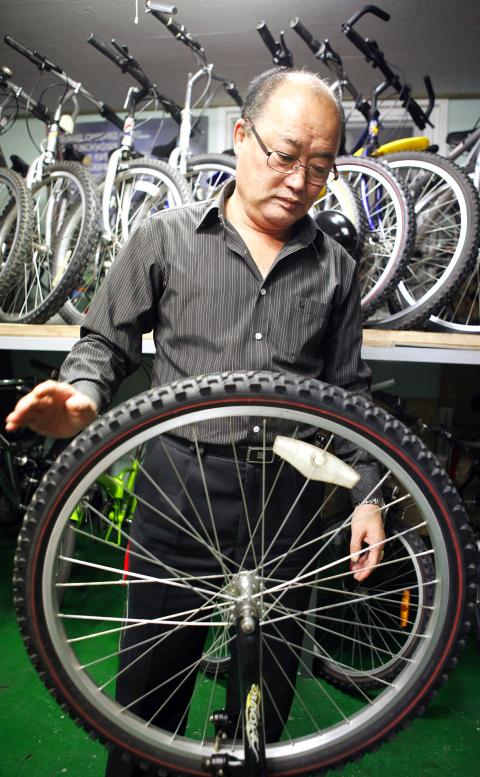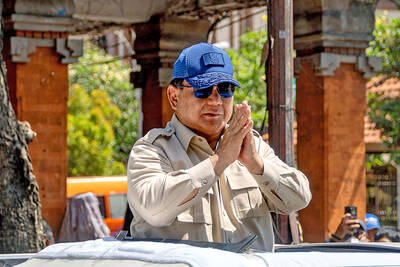For James Bond, spying was an endless succession of glamorous women and dry martinis, but for a real-life South Korean commando who undertook secret missions in the reclusive North, life was far harder.
Now aged 59 and the father of three daughters, Yoon Kyung-chul spends his days fixing up old bicycles for a charity in downtown Seoul, the South Korean capital.
That is a far cry from the day in 1973 when the 21-year old Yoon was summoned for duty to go and infiltrate North Korea, which is still technically at war with the South.

Photo: reuters
“It was 4am and three men in black suits came to my house. I didn’t have [a] chance to say a goodbye to my family,” Yoon said of the day he was recruited for the South’s Headquarters of Intelligence Detachment.
It wasn’t an official conscription. Yoon wound up on an isolated mountain without a name tag or badge of rank.
Yoon said many of the men in his new unit were enticed by the 30 million Korean won (US$25,148 at today’s exchange rate) on offer to join.
The 21-year old was trained in demolition, long-distance hiking, shooting and knife-hurling under tough conditions that included beatings for poor performance.
“There was no leave. For more than six months in a year, dressed in North Korean army uniforms, we were trained. Many people died during the training and many were injured,” he said.
Although overt hostilities between North and South Korea were stopped with a 1953 armistice, both sides conducted low-level hostilities.
About 13,000 men were trained like Yoon through to the early 1990s and more than 7,000 who worked until the early 1970s have been listed as missing or dead, according to government data. Several hundred of them are believed to be in the North.
When Yoon left the special forces in 1976 after three years’ service, he found he could not get a job and, even worse, that his own country was monitoring his activities.
“I was neither a civilian nor a soldier,” he said.
A protest movement by the former military agents saw rioting in Seoul in 2002 when several hundred of them set fire to gas canisters, eventually winning compensation and government recognition of their work.
Even so, many people still consider the ex-servicemen to be gangsters or extremists and nicknamed them “canister men.”
They still attend protests and the adverse public reaction prompted Yoon and another ex-commando to open a free bicycle repair center, donating the cycles to schools and daycare centers.
Beneath a sign on the wall of his workshop saying “What have I done for the Motherland today?” Yoon and his staff labor on.
“We said to ourselves, let’s not use our fists anymore ... Then, we picked up bicycles on streets. Our goal is to donate 600 bicycles next year,” he said. “I need to get rid of my dark past and show something better to my daughters.”

DEADLOCK: Putin has vowed to continue fighting unless Ukraine cedes more land, while talks have been paused with no immediate results expected, the Kremlin said Russia on Friday said that peace talks with Kyiv were on “pause” as Ukrainian President Volodymyr Zelenskiy warned that Russian President Vladimir Putin still wanted to capture the whole of Ukraine. Meanwhile, US President Donald Trump said that he was running out of patience with Putin, and the NATO alliance said it would bolster its eastern front after Russian drones were shot down in Polish airspace this week. The latest blow to faltering diplomacy came as Russia’s army staged major military drills with its key ally Belarus. Despite Trump forcing the warring sides to hold direct talks and hosting Putin in Alaska, there

North Korea has executed people for watching or distributing foreign television shows, including popular South Korean dramas, as part of an intensifying crackdown on personal freedoms, a UN human rights report said on Friday. Surveillance has grown more pervasive since 2014 with the help of new technologies, while punishments have become harsher — including the introduction of the death penalty for offences such as sharing foreign TV dramas, the report said. The curbs make North Korea the most restrictive country in the world, said the 14-page UN report, which was based on interviews with more than 300 witnesses and victims who had

COMFORT WOMEN CLASH: Japan has strongly rejected South Korean court rulings ordering the government to provide reparations to Korean victims of sexual slavery The Japanese government yesterday defended its stance on wartime sexual slavery and described South Korean court rulings ordering Japanese compensation as violations of international law, after UN investigators criticized Tokyo for failing to ensure truth-finding and reparations for the victims. In its own response to UN human rights rapporteurs, South Korea called on Japan to “squarely face up to our painful history” and cited how Tokyo’s refusal to comply with court orders have denied the victims payment. The statements underscored how the two Asian US allies still hold key differences on the issue, even as they pause their on-and-off disputes over historical

CONSOLIDATION: The Indonesian president has used the moment to replace figures from former president Jokowi’s tenure with loyal allies In removing Indonesia’s finance minister and U-turning on protester demands, the leader of Southeast Asia’s biggest economy is scrambling to restore public trust while seizing a chance to install loyalists after deadly riots last month, experts say. Demonstrations that were sparked by low wages, unemployment and anger over lawmakers’ lavish perks grew after footage spread of a paramilitary police vehicle running over a delivery motorcycle driver. The ensuing riots, which rights groups say left at least 10 dead and hundreds detained, were the biggest of Indonesian President Prabowo Subianto’s term, and the ex-general is now calling on the public to restore their